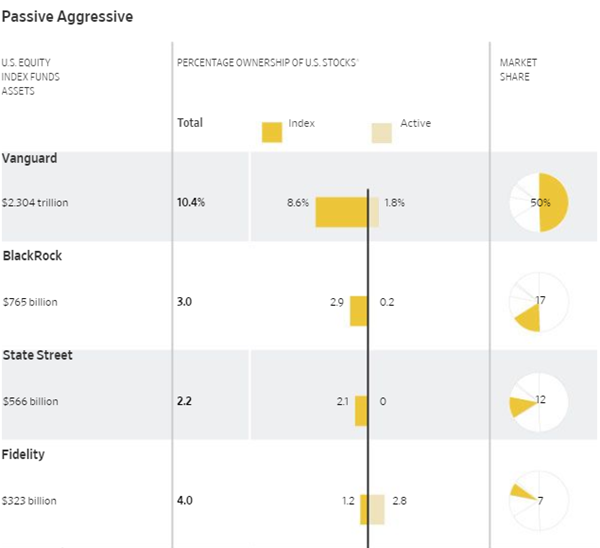THE
WALL STREET JOURNAL.
Markets
|
YOUR MONEY
|
WEEKEND INVESTOR
Bogle Sounds a Warning on Index Funds
The
father of the index fund says it’s probably only a matter of time
before they own half of all U.S. stocks; ‘I do not believe that
such concentration would serve the national interest’
|

Jack Bogle after speaking at
the 2018 Bogleheads Conference. The creator of the index fund
says their increasing dominance may create some of the ‘major
issues of the coming era.’ PHOTO: RYAN COLLERD FOR THE WALL
STREET JOURNAL |
By John C. Bogle
Nov. 29, 2018 10:15 a.m. ET
There no longer can be any doubt that the creation of
the first index mutual fund was the most successful
innovation—especially for investors—in modern financial history. The
question we need to ask ourselves now is: What happens if it becomes
too successful for its own good?
The First Index Investment Trust, which tracks the returns of the
S&P 500 and is now known as the Vanguard 500 Index Fund, was founded on December
31, 1975. It was the first “product,” as it were, of a new mutual fund manager,
The Vanguard Group, the company I had founded only one year earlier.
The fund’s August 1976 initial public offering may have been the
worst underwriting in Wall Street history. Despite the leadership of
the Street’s four largest retail brokers, the IPO fell far short of its original
$250 million target. The initial assets of 500 Index Fund totaled but $11.3
million—falling a mere 95% short of its goal.
The fund’s struggle for the attention (and dollars) of investors
was epic. Known as “Bogle’s
folly,” the fund’s novel strategy of simply tracking a broad market
index was almost totally rejected by Wall Street. The head of Fidelity, then by
far the fund industry’s largest firm, put the kiss of death on his tiny rival:
“I can’t believe that the great mass of investors are [sic] going to be
satisfied with just receiving average returns. The name of the game is to be the
best.”
Almost a decade passed before a second S&P 500 index fund was
formed, by Wells
Fargo in 1984. During that period, Vanguard’s index fund attracted
cash inflow averaging only $16 million per year.
Now let’s advance the clock to 2018. What a difference 42 years
makes! Equity index fund assets now total some $4.6 trillion, while total index
fund assets have surpassed $6 trillion. Of this total, about 70% is invested in
broad market index funds modeled on the original Vanguard fund.
Yes, U.S. index mutual funds have grown to huge size, with their
holdings doubling from 4.5% of total U.S. stock-market value in 2002 to 9% in
2009, and then almost doubling again to more than 17% in 2018. Even that
penetration understates the role of mutual fund managers, as they also offer
actively managed funds, and their combined assets amount to more than 35% of the
shares of U.S. corporations.
If historical trends continue, a handful of giant institutional
investors will one day hold voting control of virtually every large U.S.
corporation. Public policy cannot ignore this growing dominance, and consider
its impact on the financial markets, corporate governance, and regulation. These
will be major issues in the coming era.
Three index fund managers dominate the field with a collective
81% share of index fund assets: Vanguard has a 51% share; BlackRock, 21%; and
State Street Global, 9%. Such domination exists primarily because the indexing
field attracts few new major entrants.
Why? Partly because of two high barriers to entry: the huge scale
enjoyed by the big indexers would be difficult to replicate by new entrants; and
index fund prices (their expense ratios, or fees) have been driven to
commodity-like levels, even to zero. If Fidelity’s 2018
offering of two zero-cost index funds has established a new “price
point” for index funds, the enthusiasm of additional firms to create new index
funds will diminish even further. So we can’t rely on new competitors to reduce
today’s concentration.
Most observers expect that the share of corporate ownership by
index funds will continue to grow over the next decade. It seems only a matter
of time until index mutual funds cross the 50% mark. If that were to happen, the
“Big Three” might own 30% or more of the U.S. stock market—effective control. I
do not believe that such concentration would serve the national interest.
My concerns are shared by many academic observers. In a draft
paper released in September, Prof. John C. Coates of Harvard Law School wrote
that indexing is reshaping corporate governance, and warned that we are tipping
toward a point where the voting power will be “controlled by a small number of
individuals” who can exercise “practical power over the majority of U.S. public
companies.” Professor Coates does not like what he sees, and offers tentative
policy options—some necessary, often painful to contemplate. His conclusion—“The
issue is not likely to go away”—is unarguable.
Solutions to resolve the issues connected with the concentration
of corporate ownership are not self-evident, but a number of tentative
possibilities have already been advanced:
• More competition from new entrants to the index field. For the
reasons noted above, this eventuality seems highly unlikely.
• Force giant index funds to spin off their assets into a number
of separate entities, each independently managed. Such a drastic step would—and
should—face near-insurmountable obstacles, for it would create havoc for index
investors and managers alike.
• Require index funds to hold just one company in any industry.
Leaving aside the dubious ability of either academia or federal bureaucrats to
define precisely what constitutes a given industry, such a drastic change would
lead to the destruction of today’s S&P 500 index fund, by common agreement, the
most beneficial innovation for investors of the modern age.
• Timely and full public disclosure by index funds of their
voting policies and public documentation of each engagement with corporate
managers. This would take today’s transparent and constructive governance
practices several steps further.
• Require index funds to retain an independent supervisory board
with full responsibility for all decisions regarding corporate governance. The
problem with this idea is that it is not clear how such a board could add to the
present scrutiny of the fund’s independent directors.
• Limit the voting power of corporate shares held by index
managers. But such a step would, in substance, transfer voting rights from
corporate stock owners, who care about the long-term, to corporate stock
renters, who do not... an absurd outcome.
• Enact federal legislation making it clear that directors of
index funds and other large money managers have a fiduciary duty to vote solely
in the interest of the funds’ shareholders. While I believe that such a
fiduciary duty is implicit today, making it explicit, with appropriate penalties
for violations, would be a constructive step.
It is time for public officials to consider the pros and cons of
these issues with indexers, the financial community, academia, and active
managers alike—and develop national policies that support high standards of
corporate governance. It will require their working together constructively and
cooperatively.
But one thing seems crystal clear. Even if present trends
continue (sometimes they don’t), the enormous value of index funds should not be
ignored. First, index funds provide investors with the most effective
stock-market strategy of all time: buy American business and hold it forever,
and do so at rock-bottom cost. Second, index funds are among the few truly
long-term owners of stocks—for all practical purposes, permanent owners of
capital—an enormously valuable asset to society. The long-term focus of index
funds is a much needed counterweight to the short-termism favored by so many
market participants.
Prof. Coates agrees that nothing should jeopardize the existence
of today’s index funds.
“Indexing has created real and large social benefits in the form
of lower expenses and greater long-term returns for millions of individuals
investing directly or indirectly for retirement,” he writes. “A ban on indexing
would clearly not be a good idea.” I can only say, “Amen” to those words.
Mr.
Bogle is founder of The Vanguard Group and creator of the first index mutual
fund. This article is adapted from his new book, “Stay the Course: The Story of
Vanguard and the Index Revolution,” to be published by Wiley on Dec. 6.



